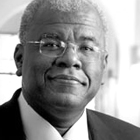expert views« Back to Expert Views Listings

Prof. (JD) Jonathan Jansen
Vice-Chancellor and Rector, UFS UV
It has long fascinated me, the fact that some white young people fit so easily into the new South Africa but most struggle to live and learn and love alongside black youth.
As I watched my white students for more than a decade, I began to understand why a minority among them seem to make and keep friends across the colour line without breaking a sweat. They visit each other‘s homes, go to the movies together, attend church groups and arrange surprise birthday parties for each other; some fall in love, get pregnant and marry. Big deal. So here are some tips on how to be white in the new South Africa.
First, get a grip on yourself. You are not better than the other person because of your skin.
You might have had more privilege and attended better schools or have parents with more money and beach-front properties, but actually you‘re just another human being trying to make things work out. So, give up on any special notions of yourself because of what you look like.
Your hair is not special, your eye colour is unremarkable, and you are just you, another human being. Skin is an accident; by the roll of the dice you could have come out differently.
Acknowledge that you are a child of privilege. If you start off with the idea that everything you have is a consequence of the hard work of your parents, you are probably from another planet. Yes they probably worked hard, but centuries of separation and privilege — white affirmative action, in essence — gave your family an emphatic advantage at the expense of black people; that is why you do not live in a shack or never attended a crappy school. Acknowledging this simple fact sets you free, big time. Denying it will make it difficult to ease into this new country since you would never understand how we came to be so unequal.
Learn to listen before you speak. As with any child of privilege, including the black middle classes, you have been subtly trained to think you know more and better than those of lower class or darker race. This I can assure you is bull. But learning to listen is hard, since you grew up hearing your parents bark orders and give instructions to lesser people (in their minds).
White youth who cruise through the new country are, without exception, people who treat others as equals and take the time to listen. By the way, if you‘re a guy this problem also applies in your relationship with women, dark or fair. Notice how you jump out of the car to fix the flat tyre while you expect her eyelids to flutter helplessly throughout this crisis. Unlearn these bad habits.
Do not listen to your parents when it comes to friendships. Most of you will have parents who get very jittery when you reach puberty and your friends are those who look and pray and eat differently from you. They worry you might become intimate friends, even family. Of course they will mask their anxieties, but at least one parent will eventually tell you why cultures are different; you might even receive a gentle threat if your friendships go a bit too far. Be better than us your parents; learn and love and live without borders for if your generation cannot make this society normal, we‘re screwed.
Always be on the lookout to learn from your friendships. Make sure your friend teaches you an African language or Indian culture or Afrikaans history or mathematics. Look to learn but also to share something worthwhile that your friend does not have access to. Learn something new about others but do not reduce black culture to Mafikizolo and gumboot dancing. Black culture, like all cultures, is richly diverse and constantly changing, so dump all that nonsense you learnt about “black people are like this or that”.
And learn to appreciate the traditions and expectations of your different friends and their families. Call the parents of your Afrikaans friends Oom en Tannie if that is what they expect; listen to older black people with deep respect and do not, I repeat, do not call them by their first names or assume familiarity. If the context seems to require it, greet with both hands. If being quiet is appreciated, make yourself invisible. This is where you need to read the situation carefully because one cultural context differs from the next.
If you do this well you might just discover, horror of horrors, that you‘re not white after all.
Published on September 17, The Times
About Prof. (JD) Jonathan Jansen
Jonathan Jansen is the Rector and Vice-Chancellor of the University of the Free State. He is the Honorary Professor of Education at the University of the Witwatersrand and Visiting Fellow at the National Research Foundation. Jansen also serves as an Independent Non-Executive Director for Advtech Limited and is the Chairman at the School Evaluation and Teacher Appraisal.
« Back to Expert Views Listings
Other Expert Views:
Q&A with Donovan Neale-May, Founder, SABLE Accelerator, CMO Council
Q&A with Kathryn Sharfman, CMO and Chief Platform Officer, Sun Exchange
Q&A with Bernard Wolfsdorf , Founder & Managing Partner, Wolfsdorf Immigration Law Group
Q&A with Pieter van Schalkwyk, CEO, XMPro
Q&A with Steuart Pennington, CEO , South Africa - The Good News
Q&A with Pumela Salela, SABLE Advisory Board Member, Global Sourcing Council
Q&A with Pieter de Villiers, Founder and CEO, Clickatell
Q&A with Anthony Stonefield, Managing Director, Gramercy Millennium Group
Q&A with Pumela Salela, SABLE Advisory Board Member, Global Sourcing Council
To Become a Superstar, Improve Your Strengths (Not Your Faults), Auren Hoffman, CEO, LiveRamp
Q&A with Faheem Kajee, Co-Founder, Found (Previously Pashash)
Q&A with Jake Davidow, Founder, Teach Me Sushi and Teach Me Chocolate
Q&A with Eran Eyal, Co-founder, Springleap
Q&A with Bradley Smith, Co-Founder, BusinessOptics
Q&A with Nick McCreath, Co-Founder, Super Simple Survey
Q&A with Barry Kayton, Founder and CEO, Cognician
Q&A with Michael Leeman, Entrepreneur and Investor, RunwaySale, Gyft and Miombo Consulting
Q&A with Anita Nel, CEO: Innovation and Business Development, InnovUS, Stellenbosch University
Q&A with Laurie Olivier, Partner - 4Di Capital, Board Member and Chairman, HealthQ Technologies
What You Know Now Beats Who You Know, Auren Hoffman, CEO, Rapleaf

